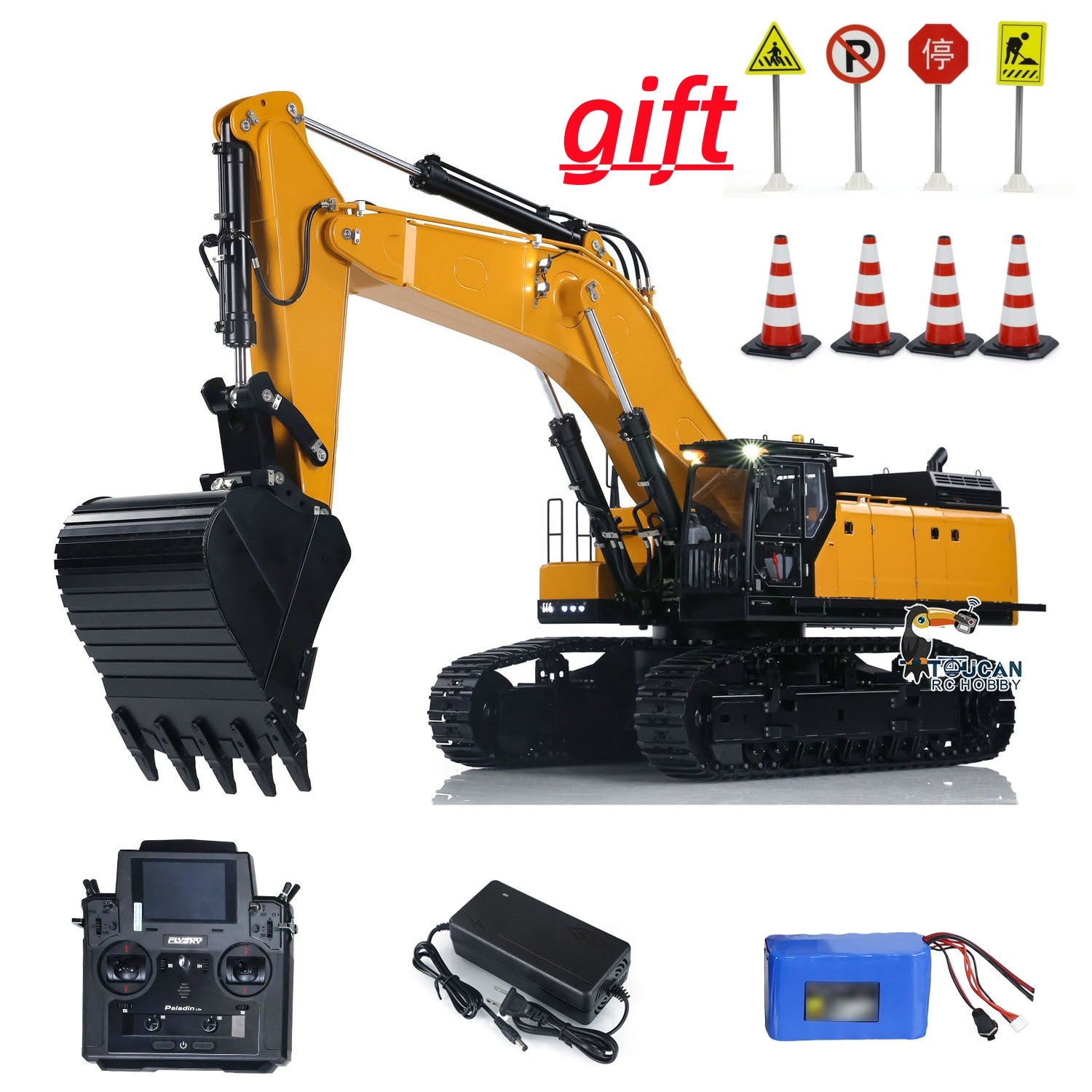Why the remote control excavator Is a Revolution in Modern Construction
Understanding How Excavator Functions and Its Influence On Efficiency
Excavators play an essential function in building and construction and mining procedures, counting on a complex interaction of mechanical and hydraulic systems. Their capability to carry out a selection of tasks depends upon both their layout and the innovation incorporated within. Recognizing these elements can greatly impact operational efficiency and performance. As innovations continue to improve the sector, one have to take into consideration exactly how these adjustments will certainly affect future practices and performance.
The Essentials of Excavator Mechanics

The Duty of Hydraulic Solutions in Excavators
At the heart of excavator operation lies the hydraulic system, which plays an essential function in powering the equipment's movements and functions. This system makes use of pressurized hydraulic liquid to transfer power, making it possible for various activities such as excavating, moving, and training. By utilizing the principles of hydraulics, excavators can perform tasks with exceptional precision and force, boosting overall functional efficiency.The hydraulic system consists of vital parts, consisting of pumps, cyndrical tubes, and valves, which interact to control the flow and direction of the fluid. When the operator involves the controls, the hydraulic liquid is guided to particular cyndrical tubes, translating the driver's commands into physical movement. This system allows for receptive and smooth activities, which are necessary in building and construction and excavation settings. double e volvo rc excavator. The performance of the hydraulic system directly impacts the productivity and convenience of the excavator, making it an indispensable component in modern-day excavation processes
Key Elements of an Excavator
Comprehending the key elements of an excavator is essential for realizing just how this powerful maker operates. An excavator includes a number of significant elements, consisting of the undercarriage, house, container, arm, and boom. The undercarriage offers stability and wheelchair, typically featuring tracks or wheels to browse numerous terrains. The home consists of the engine and hydraulic systems, allowing the operator to control movement and power the machine. The boom expands from your house, enabling upright reach, while the arm attaches to the bucket, facilitating excavating and training operations.Additionally, the taxicab houses the driver, furnished with controls for precise maneuvering. Each of these components plays a vital duty in the excavator's overall performance, adding to its efficiency and efficiency on building and construction sites. Understanding these parts helps in optimizing and keeping excavator efficiency, making certain jobs are completed safely and successfully.
Attachment Convenience and Its Advantages
Accessory versatility is an important element of excavators, allowing drivers to switch in between numerous devices customized for certain tasks. This versatility not just improves work effectiveness however likewise adds to cost-effectiveness by decreasing the requirement for multiple devices. Recognizing the various sorts of accessories offered can greatly affect the general efficiency and capability of an excavator on task websites.
Types of Accessories
While excavators are largely recognized for their digging abilities, their real flexibility depends on the broad range of add-ons available. These accessories enhance the excavator's functionality, permitting it to carry out various jobs beyond excavation. Typical accessories consist of buckets (for digging and scooping), hydraulic thumbs (for realizing products), and augers (for piercing openings) Grapples are used for taking care of and moving debris, while rippers can damage up tough surfaces. Other specialized accessories, such as plates and plows, make it possible for excavators to adapt to particular task requirements. This variety not just enhances the equipment's energy throughout different industries, including landscape design, demolition, and construction, however additionally allows operators to tailor their tools to satisfy details task needs successfully.
Increased Job Performance
Making best use of task efficiency is a main benefit of using different excavator add-ons. Various accessories permit an excavator to carry out numerous jobs without requiring to change equipment, saving useful time and labor. As an example, using a hydraulic hammer can break concrete while a pail add-on can dig deep into dirt, allowing a smooth workflow. This adaptability minimizes downtime connected with tools modifications and improves efficiency on-site. Furthermore, specialized add-ons boost precision in tasks such as grading or landscaping, resulting in better outcomes. The capacity to adjust to different job requirements not only improves operations yet likewise minimizes the requirement for added equipment, guaranteeing that tasks are completed promptly and successfully. On the whole, accessory flexibility considerably contributes to boosted job performance in excavation work.
Cost-Effectiveness and Flexibility
Cost-effectiveness is a considerable advantage of making use of versatile excavator accessories. These attachments allow a single excavator to do several jobs, reducing the requirement for additional machinery and labor - Full Report double e volvo rc excavator. By switching between buckets, hammers, and grapples, operators can tackle various projects, from digging to demolition, thus making best use of devices application. This versatility not only decreases functional costs however likewise lessens downtime connected with altering equipment. In addition, the capability to customize excavators with specialized attachments boosts productivity, as they can efficiently deal with diverse jobs according to project demands. To conclude, the mix of cost-effectiveness and convenience in excavator add-ons adds to improved operational effectiveness and source allowance in construction and excavation jobs

Advanced Modern Technology in Modern Excavators
Modern excavators are significantly furnished with advanced innovation that changes excavation processes. Automation improves operations, while enhanced gas efficiency minimizes functional prices. Furthermore, smart control systems enhance precision and safety, marking a significant evolution in excavation devices.
Automation in Excavation Processes
As excavation innovation progresses, automation has actually become an important part in improving efficiency and precision on task websites. Modern excavators are furnished with sophisticated automated systems that facilitate jobs such as grading, digging, and trenching with marginal operator treatment. These systems make use of sensors, GPS, and maker understanding formulas to assure exact placing and deepness control, substantially reducing the margin for error. In addition, automation allows operators to concentrate on critical decision-making as opposed to manual controls, resulting in enhanced performance overall. Such technologies not only simplify workflows yet likewise improve security by decreasing human mistake in intricate operations. Consequently, the assimilation of automation in excavation processes represents a significant development in building and construction modern technology, driving the sector towards better efficiency and effectiveness.
Improved Fuel Efficiency
Innovations in modern technology have actually additionally caused substantial renovations in gas performance for modern excavators. Modern machines are furnished with sophisticated engines that optimize power result while reducing gas intake. These engines use ingenious burning technologies, such as turbocharging and direct gas injection, to enhance efficiency and performance. In addition, light-weight products in construction decrease general weight, enabling much less power expenditure during procedure. The introduction of variable speed controls enables drivers to change engine efficiency according to certain jobs, better lessening gas usage. As an outcome, these enhancements not only lower operational prices yet additionally contribute to environmental sustainability by lowering emissions. Generally, boosted fuel effectiveness in excavators is an essential development that bolsters productivity and economic practicality in the building and construction industry.
Smart Control Solution
While drivers browse significantly complicated task sites, wise control systems in excavators have actually become necessary devices for improving effectiveness and precision. These advanced innovations make use of sensors and formulas to check numerous criteria such as load weight, terrain problems, and operational efficiency. By immediately readjusting hydraulic functions, smart systems enhance equipment efficiency, causing enhanced efficiency and lowered wear on elements. Furthermore, drivers profit from intuitive user interfaces that supply real-time comments and diagnostics, permitting for notified decision-making. This combination of technology not just improves procedures however likewise lessens human error, adding to safer job settings. As the building and construction market remains to progress, smart control systems will play a crucial function in forming the future of excavator efficiency and performance.
Enhancing Operational Effectiveness With Excavators
Excavators play an important role in improving operational effectiveness throughout numerous construction and excavation tasks. Their versatility permits several tasks, including product, excavating, and lifting handling, which simplifies workflows and reduces the need for added tools. With effective hydraulic systems, excavators can do sturdy tasks with accuracy, substantially reducing the moment required to complete tasks. The integration of sophisticated technology, such as general practitioner and automated controls, further enhances their operation, making it possible for drivers to accomplish better precision and minimize material waste. Furthermore, modern excavators are created to take in much less gas and minimize emissions, adding to both price financial special info savings and environmental sustainability. By utilizing excavators successfully, building groups can boost productivity, satisfy task due dates, and improve general site administration. This multifunctionality and effectiveness make excavators important devices in the modern-day building and construction landscape.
The Future of Excavators in Building And Construction and Mining Industries
As the building and mining industries progress, the future of go to my blog excavators is positioned for significant change driven by technical innovation and transforming functional demands. Advancements in automation and artificial knowledge are reshaping excavator abilities, permitting boosted precision and performance in operations. Autonomous excavators are arising, decreasing the need for human treatment and minimizing the threat of accidents.Moreover, the assimilation of telematics and IoT modern technology enables real-time monitoring of machine performance and anticipating maintenance, enhancing uptime. Environment-friendly designs, consisting of hybrid and electric designs, are getting traction, lining up with sustainability goals within the industry.Additionally, the use of advanced materials and lighter layouts boosts fuel performance while maintaining performance requirements. As these fads progression, excavators will certainly play a crucial role in meeting the enhancing demands for productivity and safety in building and construction and mining, eventually transforming functional landscapes.
Often Asked Inquiries
Just How Do Climate Condition Influence Excavator Efficiency?

Weather considerably influence excavator efficiency, as rain and mud can prevent traction and stability, while extreme temperatures may influence hydraulic systems. Operators has to adjust to these variables to assure optimal functionality and safety during operations.
What Precaution Should Operators Adhere To While Making Use Of Excavators?
Safety and security actions for excavator operators consist of using suitable personal safety devices, conducting pre-operation assessments, guaranteeing correct interaction with ground workers, keeping a risk-free distance from overhead hazards, and adhering to established functional procedures to avoid crashes.
How Frequently Should Excavators Be Preserved for Optimum Performance?
Excavators should be maintained on a regular basis to guarantee peak efficiency, usually every 250 operating hours or as specified by the producer. Routine checks boost dependability, protect against unexpected failures, and extend the lifespan of the tools.
What Is the Typical Lifespan of an Excavator?
The ordinary life expectancy of an excavator usually varies from 10,000 to 15,000 hours of operation. Factors influencing longevity include maintenance techniques, operating conditions, and the high quality of the maker itself, influencing general performance and efficiency.

Can Excavators Run on Irregular Terrain Efficiently?
Excavators can run successfully on unequal surface as a result of their articulated layouts and adjustable tracks. These features enable them to maintain stability and grip, enabling reliable operation in difficult environments commonly encountered in construction and landscaping tasks. Each of these components plays a crucial duty in the excavator's general capability, adding to its performance and efficiency on construction sites. Making the most of work efficiency is a key advantage of utilizing numerous excavator accessories. While drivers browse progressively complex job websites, wise control systems in excavators have actually emerged as necessary tools for improving effectiveness and precision. Excavators play an essential role in enhancing operational performance throughout various building and construction and excavation projects. Advances in automation and fabricated intelligence are reshaping excavator capacities, permitting for enhanced accuracy and performance in procedures.